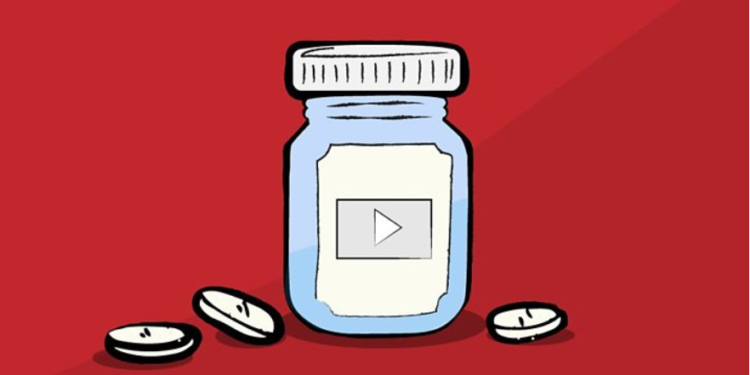YouTube’s algorithm promotes fake cancer cures in a number of languages and the site runs adverts for major brands and universities next to misleading videos, a BBC investigation has found.
Searching YouTube across 10 languages, the BBC found more than 80 videos containing health misinformation – mainly bogus cancer cures. Ten of the videos found had more than a million views. Many were accompanied by adverts.
The unproven “cures” often involved consuming specific substances, such as turmeric or baking soda. Juice diets or extreme fasting were also common themes. Some YouTubers advocated drinking donkey’s milk or boiling water. None of the so-called cures offered are clinically proven to treat cancer.
Appearing before the fake cancer cure videos were adverts for well-known brands including Samsung, Heinz and Clinique.
YouTube’s advertising system means that both the Google-owned company and the video makers are making money from the misleading clips.
In January, YouTube announced they would be “reducing recommendations of borderline content and content that could misinform users in harmful ways—such as videos promoting a phony miracle cure for a serious illness.”
But the company said the change would initially only affect recommendations of a very small set of videos in the United States, and does not apply in languages other than English.
The BBC search covered English, Portuguese, Russian, Arabic, Persian, Hindi, German, Ukrainian, French and Italian.
We found, for example, that in Russian, a simple search for “cancer treatment” leads to videos advocating drinking baking soda. Watching these videos in turn led to recommendations for other unproven “treatments” such as carrot juice or extreme fasting.
Erin McAweeney, a research analyst at the Data & Society institute, explained that because YouTube’s algorithm recommends similar videos to the ones you have just watched, it is continuously “carving a path” from one video to the next, regardless of the credibility of the advice offered within.
“Someone can start out on a credible video and be suggested to watch a juice cure video next. A recommendation system doesn’t know credible from non-credible content.” McAweeney says.
YouTube has stated that its recommendation system – which has been accused of leading users down rabbit holes of conspiracy theories and radicalisation – would change, recommending videos that are credible and trustworthy to people that are watching videos that might not be.
YouTube’s Community Guidelines ban harmful content including: “Promoting dangerous remedies or cures: content which claims that harmful substances or treatments can have health benefits.”
Many of the fake cancer cures the BBC found, such as juicing, were not in themselves harmful, but could indirectly damage a cancer sufferer’s health – for instance, if they neglect conventional medical approaches in favour of the so-called cures.
Making money with misinformation
Researchers from BBC Monitoring and BBC News Brasil were served a range of adverts before the fake cure videos.
In addition to Samsung, Heinz and Clinique, the BBC saw adverts for travel website Booking.com and writing app Grammarly, for Hollywood films, and for British universities including the University of East Anglia and the University of Gloucestershire. All of the ads appeared alongside potentially harmful misinformation.
The companies and universities distanced themselves from the misleading content.
Samsung said the campaign they were running had “no connection or correlation” with the fake cancer cure video that ran after it. “Samsung follows and insists on the highest brand safety guidelines on all advertising platforms it uses,” the company said in a statement.
Kraft Heinz said that it “has a number of both automated and human controls continuously in place to ensure we avoid our advertising running with inappropriate content.
“This particular instance is concerning to us and we have taken steps to block this channel.”
Grammarly, a company whose adverts appeared 20 times alongside fake cancer cure videos views by BBC researchers, said: “Upon learning of this, we immediately contacted YouTube to pull our ads from any such channels and to ensure the ads will not appear alongside content promulgating misinformation.”
Clinique owner Estee Lauder and Booking.com did not respond to requests for comment.
The two universities said that their adverts appeared next to misleading videos just once each, and that the channels were blocked from their advertising campaigns after being contacted by the BBC.
The University of East Anglia, which has its own cancer research programme, said: “No payment was made by the university [specifically for the advert which ran next to the fake cure video] and we have contacted Google to ensure that placement does not happen again.”
The University of Gloucestershire said: “When advertising on YouTube, content changes quickly and even the most attentive human and technological effort can require constant diligence. As such we are continuously working with Google to ensure this type of placement doesn’t occur again.”
Read the full article on bbc.com
How Youtube makes money from fake cancer cure videos
ADVERTISEMENT






